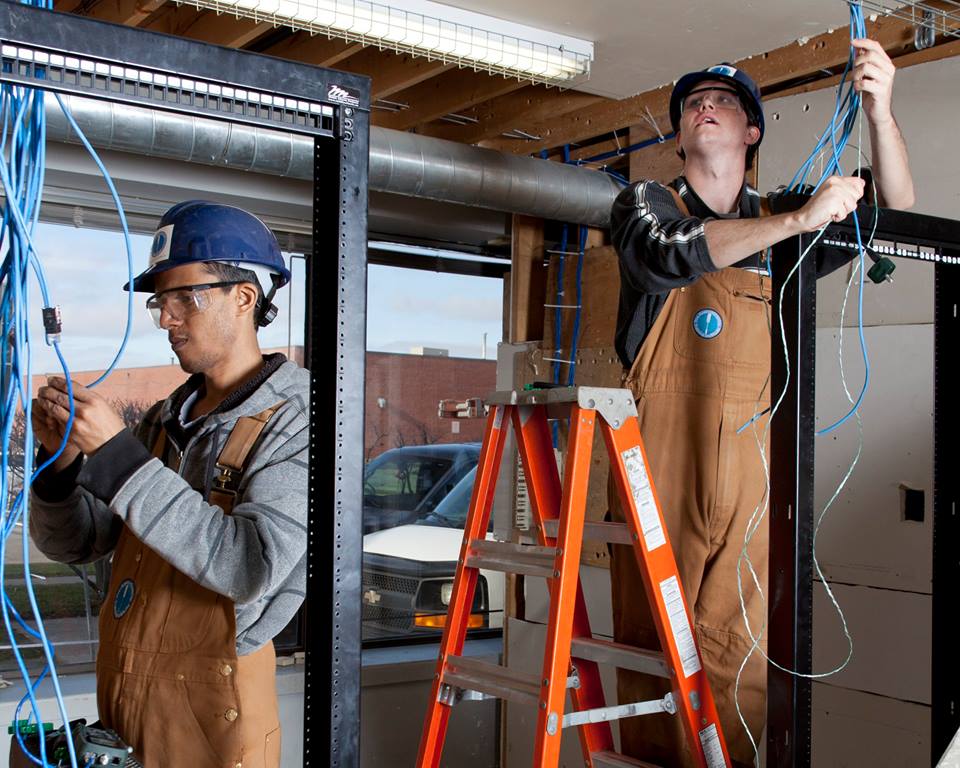Updated December 2025
What exactly is network cabling?
Cabling specialists install and repair telecommunications lines. They work in homes and businesses, setting up and troubleshooting internet, cable and satellite TV, and phone lines.
This trade requires a unique combination of customer service skills, technical aptitude, adaptiveness to emerging technology, and exceptional problem-solving.
Wondering if a network cabling program is right for you? Start by answering these five questions.
1. Are you interested in telecommunications technology?
In recent years, amazing advances in telecommunications have transformed the way people connect, do business, and engage with the world. From broadcasting satellites to fiber-optic transmission cables, there is a vast array of hardware, software, and service providers across this fast-evolving industry.
Cabling technicians play a key role in keeping us connected to the networks and data we've come to rely on so completely. If you're considering working in this field, you should have a natural interest in telecommunications science, technology, and innovation.
2. Are you comfortable working at heights?
Installing, testing, and repairing telecommunications lines may take you up onto the roof of a building, or to the top of a pole or tower. Network cabling courses usually include several safety training modules related to working at heights, using lifts, erecting scaffolding, etc.—but it's important for students to feel relatively comfortable in this area before starting the program.
3. Are you comfortable working with numbers & technical specs?
In addition to servicing existing lines, cabling technicians also plan and install new networks. This process demands facility with numbers and basic math, as you'll be interpreting blueprints, technical specifications, and preparing installation diagrams. Plus, throughout your career, you'll want to keep up to date by reading technical publications and building new skills.
4. Do you have a natural flair for technical problem solving?
Part of your job as a telecommunications or cabling technician is to test circuits, isolate problems, and find solutions for unexpected malfunctions. Whether called upon to repair a pole or tower, or troubleshoot an unreliable home internet connection, cabling specialists must think on their feet to find safe, effective solutions—as quickly as possible.
If you're hoping to pursue network cabling training, you should already possess some of the key attributes of an independent problem solver, including:
- Staying focused and calm under pressure
- Being able to reason logically and follow instructions/procedures
- Using creative thinking skills (imagine a range of possible solutions to a given problem)
- Taking an analytical approach (compare and evaluate solutions to find the best option)
You're probably the person friends and family turn to when the TV satellite won't work or the router malfunctions. You know how to work through a technical challenge with patience and precision.
5. Are you a patient and clear communicator?
Like with many trades, customer service is a major part of the job for cabling specialists. They work closely with supervisors, colleagues, and customers to explain and coordinate repairs and installations. This is a career for a genuine "people person."
Customers need to feel comfortable having you in their homes, and you may need to walk them through technical concepts and procedures—such as which cables and wiring devices are most appropriate for a given situation, or the proper way to use telecommunications equipment. Professionals in this role must possess solid written and verbal communication skills and be diplomatic, patient, and friendly.
Think a network cabling program is a good match for your interests and career goals? Looking for a reliable training program in Ontario?
Your next step is to speak with admissions. An admissions advisor will guide you through the network cabling specialist program, costs, financial aid, how to apply, and more.
Chat live with an advisor now. Or click below to explore the program in more detail. We're here to help!





